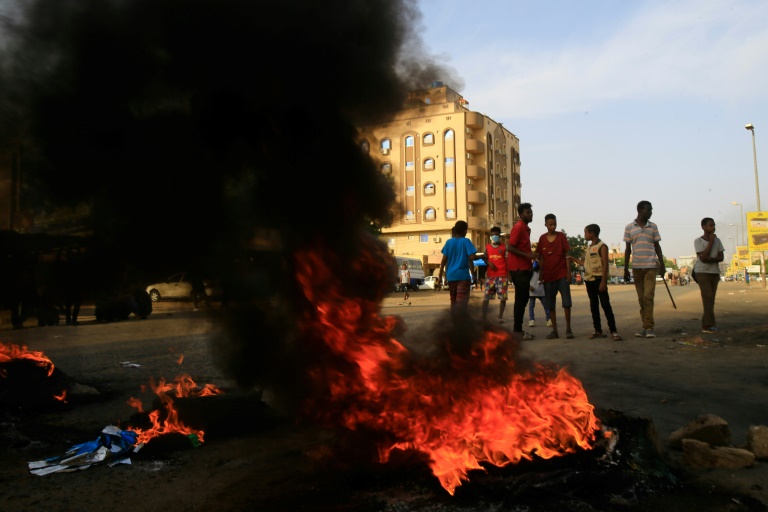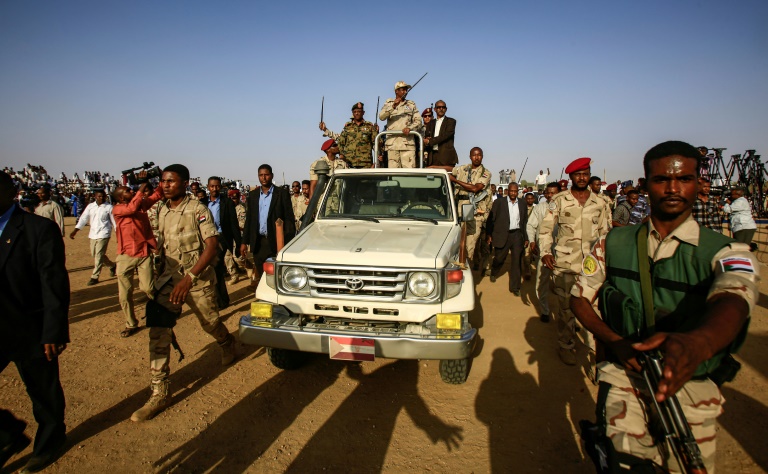
Head of a Sudanese investigative committee Fatah al-Rahman Saeed (C) reveals findings of a probe into the deadly raid on a Khartoum protest camp © AFP / ASHRAF SHAZLY
Khartoum, Sudan, Jul 28 – A probe into a deadly June raid on a Khartoum protest camp revealed Saturday that members of a feared Sudanese paramilitary group were involved in it, even as hundreds of demonstrators rallied to demand an independent investigation.
Shortly before dawn on June 3, gunmen in military fatigues raided the site of a weeks-long sit-in outside army headquarters, shooting and beating protesters in an operation that also left hundreds wounded.
Demonstrators and rights groups accused the paramilitary Rapid Support Forces of carrying out the crackdown, a charge denied by the group’s powerful chief, General Mohamed Hamdan Daglo.
But a joint probe by prosecutors and the ruling military council revealed on Saturday that RSF paramilitaries were involved in the raid along with some members of other security forces.
Crowds of protesters had camped out at the site from April 6 onwards, initially to seek the army’s support in toppling longtime leader Omar al-Bashir.
Bashir was ousted on April 11, but protesters pressed on with the sit-in, demanding that the military council which replaced him cede power to civilians.

Members of Sudan’s Rapid Support Forces (RSF) paramilitaries stand on guard outside the offices of the anti-corruption prosecution in the capital Khartoum on June 16, 2019, as the country’s ousted president appears before prosecutors over charges of corruption and illegal possession of foreign currency.Bashir was On June 16 seen in public for the first time since being ousted, as he was driven to the prosecutor’s office. The former strongman, who ruled his northeast African nation with an iron fist for three decades, was toppled on April 11 after weeks of protests against his reign. © AFP / Yasuyoshi CHIBA
Fatah al-Rahman Saeed, a prosecutor who headed the investigation, said orders had been given to security forces to clear an area called Colombia, near the protest camp.
But, he said, an RSF general had separately ordered a colonel to disperse the sit-in, despite having no such order from further up the chain of command.
“They led the forces… inside the sit-in area and ordered them to get down from their vehicles and whip the protesters,” Saeed told reporters.
Saeed identified the RSF general who allegedly ordered the raid by his initials A.S.A., and the colonel as A.A.M.
“It is clear to the committee that General A.S.A issued an order to Colonel A.A.M to deploy anti-riot forces of the RSF” to break up the sit-in, Saeed said.
– ‘Forces disobeyed orders’ –
The country’s ruling generals have insisted they did not order the dispersal of the protest camp, but had ordered an operation including RSF and other security forces, limited to clearing Colombia, which they say was plagued by drug dealing and violence.

Demonstrators burn tires in the middle of a main street in Khartoum on July 27, 2019, as they protest against the results of the probe into the June raid on a Khartoum protest camp revealed.Demonstrators and rights groups had accused the paramilitary Rapid Support Forces of carrying out the crackdown, a charge denied by the group’s powerful chief, General Mohamed Hamdan Daglo. But a joint probe by prosecutors and the ruling military council revealed on Saturday that RSF paramilitaries were involved in the raid. © AFP / ASHRAF SHAZLY
Saeed said an RSF captain, identified as H.B.A, was involved in clearing Colombia but later took part in dispersing the sit-in.
He said another group of security personnel, also involved in clearing Colombia, “disobeyed orders and entered the sit-in area”.
They “removed barricades, fired tear gas and fired intense and random bullets that led to the killing and wounding of protesters and the burning of tents,” Saeed said, adding that a total of eight officers were involved in the raid.
Days after the raid, rights group Amnesty International said that members of “RSF are responsible for… the ongoing bloody crackdown on protesters in Khartoum since 3 June”.
– Protesters demand independent probe –
Hundreds of protesters rallied in parts of Khartoum even as riot police fired tear gas to disperse some, an AFP correspondent reported.
Late on Saturday the protest group Sudanese Professionals Association said it rejected the probe “at the procedural level” itself.
“It was commissioned by the (ruling) military council, this is challenging its integrity as the military council itself is accused in this case,” said the group that first launched protests against Bashir in December.
Demanding that an independent probe be held, the SPA insisted that the accused be identified by their full names, rather than by their initials.
“The commission has come up with flawed and incomplete statistics for martyrs, victims and wounded,” it said.
Doctors linked to the protest movement say 127 people were killed during the June 3 raid, but Saeed gave a lower toll on Saturday.
He said that 17 people were killed on June 3, while a total of 87 died between that day and June 10.

Mohamed Hamdan Daglo (C), also known as Hemeti, deputy head of Sudan’s ruling Transitional Military Council (TMC) and commander of the Rapid Support Forces (RSF) paramilitaries, waves a baton as he rides in the back of a vehicle surrounded by RSF members and crowds of supporters in the village of Qarri, about 90 kilometres north of Khartoum, on June 15, 2019. © AFP / ASHRAF SHAZLY
Angry protesters rejected those figures and the probe’s finding that “no cases of rape” had taken place during the sit-in, in contrast to numerous allegations by the protest movement.
“This investigation is meaningless because we know who cracked down on protesters,” said protester Amam Al-Tahir.
The sit-in raid caused the collapse of talks between protest leaders and Sudan’s ruling generals, which did not resume until weeks later, after intense mediation by African Union and Ethiopian diplomats.
The two sides have now agreed to form a new joint civilian-military ruling body for a transitional period of 39 months.
This governing body would then install an overall civilian administration as demanded by demonstrators.
Although the generals and protest leaders have signed a power sharing deal, several issues are still pending — including justice for the demonstrators killed since the first December protests against Bashir.
About The Author









































